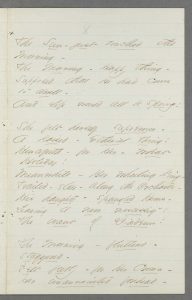 The Sun – just touched the
The Sun – just touched the
Morning
The Morning – Happy thing –
Supposed that He had come
to dwell –
And Life would all be Spring!
She felt herself supremer –
A Raised – Etherial Thing!
Henceforth – for Her – what
Holiday!
Meanwhile – Her wheeling King –
Trailed – slow – along the Orchards –
His haughty – spangled Hems –
Leaving a new nescessity!
The want of Diadems!
The Morning – fluttered – staggered –
Felt feebly – for Her Crown –
Her unannointed forehead –
Henceforth – Her only One!
Link to EDA manuscript. Originally in Poems: Packet XXXVII, fascicle 10, ca. 1860-1861. Courtesy of Houghton Library, Harvard University, Cambridge, Mass. First published in Poems (1891), 116, as four quatrains.
Dickinson copied this poem into Fascicle 10, which is dated to 1861. It is a good introduction to Dickinson’s symbolic use of spring. In this allegory, which could refer to a number of situations, the sun’s merest touch of the morning raises the speaker to such a height that she feels “Life would all be spring.” That is, existence would be charged with the expectation of all that spring brings to a world clutched by a recalcitrant New England winter. Dickinson amplifies that spring mind-set as “supremer” (than what?), “a Raised – Etherial Thing!” and “Holiday.” It’s important to note that Dickinson underlines all these words and also adds an exclamation point. Much emphasis.
But, the allegory continues, the sun is “haughty” and has “spangled Hems,” words Dickinson links to Susan Dickinson and her penchant for trendy luxuries like sequined dresses, according to Judith Farr. Showy and aloof, the Sun does not “crown” the morning—that is, give her real “diadems,” or authentic signs of royalty, worth, independence (see our post on Entitle)—or salvation, if we are reading this as an allegory of religious aspiration.
And so morning ends up with an “unannointed forehead.” This is only the second instance of this unusual word in Dickinson’s canon; the first occurs in the poem from which our project takes its title, “Dare you see a Soul at the White Heat? (F401A, J365). In our discussion of that poem we commented:
To be “unanointed” (notice that Dickinson spells it with two n’s) means to be unconsecrated or not authorized by God or a higher power.
So here, the morning wants to be authorized by the higher power of the sun, but is disappointed. Sandra Gilbert and Susan Gubar read this poem as “almost a darkened revision of ‘The Daisy follows soft the Sun.’” Can morning herself bring on the rebirth that is spring, or does it always require an external fertilizing, masculine power?
Sources
- Gilbert, Sandra and Susan Gubar. The Madwoman in the Attic: The Woman Writer and the Nineteenth-Century Literary Imagination. New Haven, Yale University Press, 1979, 601-02.
- Farr, Judith. The Passion of Emily Dickinson. Cambridge: Harvard University Press. 1992, 41.

